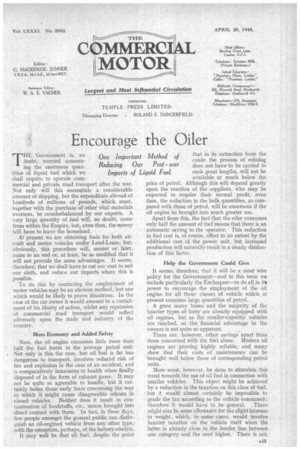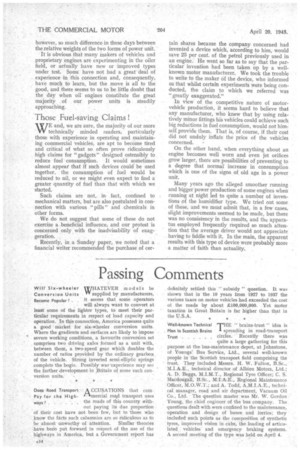Encourage the Oiler
Page 15

Page 16

If you've noticed an error in this article please click here to report it so we can fix it.
THE Government is, no ioubt,worried concerning the enormous quantities of liquid fuel which we shall require to operate commercial and private road transport after the war. Not only will this necessitate a considerable amount of shipping, but the expenditure abroad of hundreds of millions of pounds, which must, together with the purchase of other vital materials overseas, be counterbalanced by our exports. A very large quantity of fuel will, no doubt, come from within the Empire, but, even then, the money will have to leave the homeland.
At present we are obtaining fuels for both aircraft and motor vehicles under Lend-Lease, but, obviously, this procedure will, sooner or later, come to an end or, at least, be so modified that it will not provide the same advantages. It seems, therefore, that we shall have to cut our coat to suit our cloth, and reduce our imports where this is possible.
To do this by restricting the employment of motor vehicles may be an obvious method, but one which would be likely to prove disastrous. In the case of the car owner it would amount to a curtailment of his liberty of action, whilst any repression of commercial road transport would reflect adversely upon the trade and industry of the country.
More Economy and Added Safety Now, the oil engine consumes little more than half the fuel burnt in the average petrol unit.
/ Not only is this the case, but oil fuel is far less dangerous to transport, involves reduc'ed risk of fire and explosion in the case of an accident, and is comparatively innocuous to health when finally disposed of in the form of exhaust gases. It may not be quite so agreeable to handle, but it certainly belies those early fears concerning the way in which it might cause disagreeable odours in closed vehicles. Neither does it result in contamination of foodstuffs, etc., unless brought into direct contact with them. In fact, in these days, few people amongst the general public can distinguish an oil-engined vehicle from any other type,with the exception, perhaps, of the battery-electric. It may well be that oil fuel, despite the point that in its extraction from the crude the process of refining does not have to be carried to such great lengths, will not be available at much below the price of petrol. Although this will depend greatly upon the reaction of the suppliers, who may be expected to require their normal profit, even then, the reduction in the bulk quantities, as coinpared with those of petrol, will be enormous if the oil engine be brought into much greater use.
Apart from this, the fact that the oiler consumes only half the amount of fuel means that there is an automatic saving to the operator. This reduction in fuel cost is, of course, offset to an extent by the additional cost of the power unit, but increased production will naturally result in a steady diminution of this factor.
Help the Government Could Give It seems, therefore, that it will be a most wise policy for the Government—and in this term we include particularly the Exchequer—to do all in its power to encourage the employment of the oil engine for all those classes of vehicle which at present consume large quantities of petrol.
A great many buses and the majority of the heavier types of lorry are already equipped with oil engines, but as the smaller-capacity vehicles are reached, so the financial advantage to the owners is not quite so apparent.
There are, however, other savings apart from those concerned with the fuel alone. Modern oil engines are proving highly reliable, and many show that their costs of maintenance can be brought well below those of corresponding petrol units.
More must, however, be done to stimulate this trend towards the use of oil fuel in connection with smaller vehicles. This object might be achieved by a reduction in the taxation on this class of fuel, but it would almost certainly be impossible to grade the tax according to the vehicle concerned ; therefore it would have to be general. There might also be some allowance for the slight increase in weight, which, in some cases, would involve heavier taxation on the vehicle itself when the latter is already close to the border line between one category and the next higher. There is not, however, so much difference in these days between the relative weights of the two forms of power unit.
It is obvious that many Makers of vehicles and proprietary engines are experimenting in the oiler field, or actually have new or improved types under test. Sont have not had a great deal of experience in this connection and, consequently, have much to learn, but the move is all to the good, and there seems to us to be little doubt that the day when oil engines constitute the great majority of our power units is steadily approaching.
Those _Fuel-saving Claims 1
WE and, we are sure, the majority of our more technically minded readers; particularly those with experience in operating and maintaining commercial vehicles, are apt to become tired and critical of what so often prove ridiculously high claims for " gadgets" designed ostensibly to reduce fuel consumption. It would sometimes almost appear that if such devices could be used together, the consumption of fuel would be reduced to nil, or we might even expect to find a greater quantity of fuel than that with which we started.
Such claims are not, in. fact, confined to mechanical matters, but are also postulated in connection with various " pills " and chemicals in other forms.
We do not suggest that some of these do not exercise a beneficial influence, and our protest is concerned only with the inadvisability of exaggeration.
Recently, in a Sunday paper, we noted that a financial writer recommended the purchase of cer tam n shares because the company concerned had invented a device which, according to him, would save 25 per cent, of the petrol previously used in an engine. He went so far as to say that the particular invention had been taken up by a wellknown motor manufacturer. We took the trouble to write to the maker Of the device, who informed us that whilst certain experiments were being conducted, the claim to which we referred was "greatly exaggerated."
In view of the competitive nature of motorvehicle production, it seems hard to believe that any manufacturer, who knew that by using relatively minor fittings his vehicles could achieve such big reductions in fuel consumption, would not himself provide them. That is, of course, if their cost did not unduly inflate the price of the vehicles concerned.
On the other hand, when everything about an engine becomes well worn and even jet orifices grow larger, there are possibilities of preventing to a degree that normal increase in consumption which is one of the signs of old age in a power unit.
Many years ago the alleged smoother running and bigger power production of some engines when running at night led to quite a number of inventions of the humidifier type. We tried out some of these, and we must admit that, in a few cases, slight improvements seemed to be made, but there was no consistency in the results, and the apparatus employed frequently required so much attention that the average driver would not appreciate having to fiddle with it. In the main, the apparent results with this type of device were probably more a matter of faith than actuality.




















































